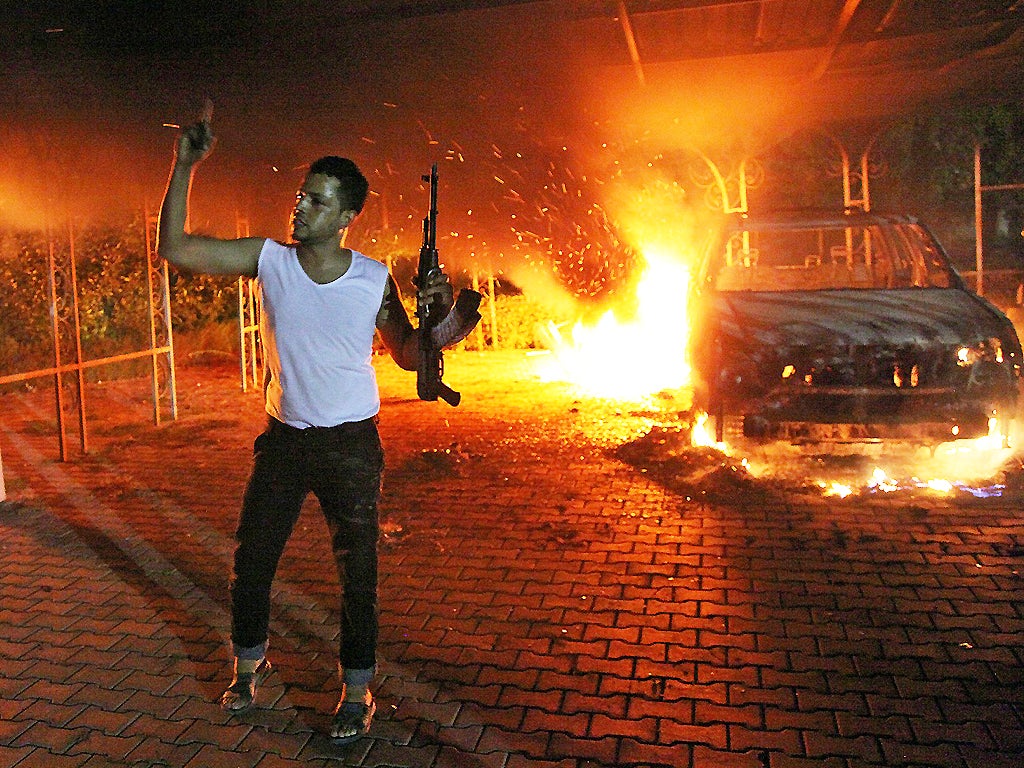'Leave immediately': Britons told to get out of Benghazi after threat from al-Qa’ida

The Government has urged British nationals to leave Libya's second city, Benghazi, in response to a "specific threat to Westerners" from terror groups operating in North Africa.
Defence sources confirmed the warning is linked to the activities of al-Qa'ida in the Islamic Maghreb (Aqim). An offshoot of Aqim was responsible for last week's hostage crisis at the In Amenas gas plant in Algeria in which 37 Westerners were killed, along with 29 Islamists.
The Foreign Office refused to go into details but the threat could be connected to one of Aqim's Libyan splinter groups, Ansar al-Sharia, whose members were chased out of Benghazi by protesters after the killing of US ambassador Chris Stevens on 11 September last year.
Dutch and German citizens have also been advised to join the exodus, while Egypt has restricted movement across its border with Libya due to security concerns.
Intelligence reports from Egypt as well as intercepted communications from Burkina Faso and Algeria led to the warning being issued. Western interests, rather than explicitly British ones, were said to be the terrorists' intended target. Governments across North and West Africa have been on heightened alert following last week's hostage crisis in the Sahara.
"We are now aware of a specific and imminent threat to Westerners in Benghazi," the Foreign Office said, "and urge any British nationals who remain there against our advice to leave immediately."
Libyan authorities said the evacuation order was "not rational" and demanded an explanation. The threat is not thought to involve a "massive attack" of the type that was launched on In Amenas, but rather a targeted assassination or kidnappings.
The city is the business hub of eastern Libya and was the birthplace of the uprising that toppled Colonel Gaddafi. However, since the dictator's death it has also been used as a base by several jihadist groups including Ansar al-Sharia, which is seen as the new face of al-Qa'ida in the wake of the Arab Spring. It is believed that individuals from Ansar al-Sharia remain in the city while the group has withdrawn.
Al-Qa'ida's second-in-command in the Arabian Peninsula, Said Ali al-Shehri, reportedly died from injuries he sustained after being wounded by Yemeni security forces in October. The death of the Saudi-born militant who rose through al-Qa'ida's ranks after being freed from Guantanamo Bay in Cuba was announced by Yemen's state news agency but was not confirmed by al-Qa'ida.
Violence in Benghazi has targeted foreigners as well as Libyan officials in recent months, with assassinations, bombings and other attacks. As well as the 11 September assault on the US consulate, an Italian diplomat's car was fired on by militants earlier this month. Rome has suspended consular activities in the city and evacuated staff.
Britain's ambassador to Libya, Sir Dominic Asquith, narrowly escaped injury last June when his convoy in Benghazi was hit by rocket-propelled grenades, reinforcing concerns that the city's police and government militia may have been infiltrated.
This week Sir Kim Darroch, David Cameron's national security adviser, held talks in Tripoli with Libya's Prime Minister, Ali Zidan, in which security was top of the agenda. French citizens, including doctors working at Benghazi hospitals, have left the city and the French cultural centre has been closed over concerns of retaliatory attacks following France's military intervention in Mali. A few Britons and a handful of German and Dutch citizens remain in Benghazi, many of them acting as security contractors or aid workers.
Attempts to step up security have been complicated by recent splits within the mosaic of groups supporting Aqim. In Mali, Ansar Dine – one of the three largest groups controlling the Islamist-occupied north of the country – split and an offshoot calling itself the Islamic Movement for Azawad said it "rejected all forms of extremism and terrorism".
Drones inquiry launched by UN
The United Nations has launched an inquiry into the impact and legality of drone strikes, which have killed hundreds of civilians in Pakistan and elsewhere in the past ten years.
British drone strikes in Afghanistan, US strikes in Pakistan and Israeli drone attacks in the Palestinian Territories will all be investigated.
The investigation will be led by a British lawyer, Ben Emmerson QC, who yesterday called for “accountability and reparation where things have gone badly wrong”.
Strikes by unmanned air vehicles (UAVs), or drones, have become a widely used strategy for nations fighting armed militia, but have been criticising for causing hundreds of civilians casualties.
Subscribe to Independent Premium to bookmark this article
Want to bookmark your favourite articles and stories to read or reference later? Start your Independent Premium subscription today.

Join our commenting forum
Join thought-provoking conversations, follow other Independent readers and see their replies